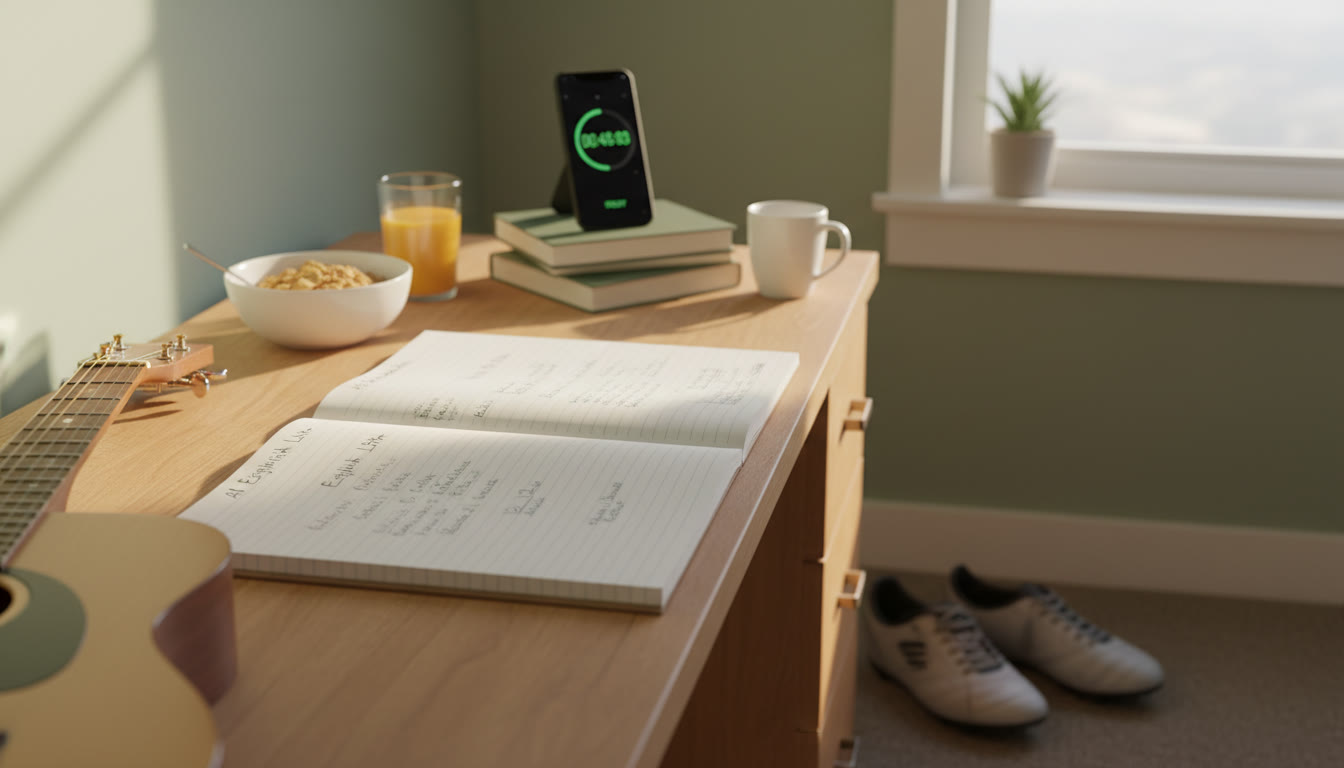Introduction: Why a Weekend-Only Plan Works for Athletes and Artists
Being on the field, in the studio, backstage, or rehearsing all week doesn’t mean you have to give up the chance to earn college credit through Advanced Placement. If your weekdays are jam-packed with training, practice, performances, or travel, a weekend-only AP plan can be the difference between burnout and success. This post walks you through a humane, efficient, and research-informed approach to preparing for AP exams using only weekend time blocks—two well-structured days every week, for months. You’ll get realistic schedules, targeted study techniques, and a sample plan you can adapt to your AP subject, whether it’s Calculus, Biology, English, or an arts course that includes portfolio work.

Who This Plan Is For (And Who Might Need a Different Approach)
This weekend-only approach is tailored for committed students who:
- Have heavy weekday commitments to athletics, arts, or work.
- Want steady, sustainable improvement without daily study sessions.
- Prefer longer focused blocks (2–4 hours) to many short ones.
It may not be ideal for students who:
- Are starting very late (less than 6 weeks before the exam) and need intensive daily remediation.
- Require special accommodations that change study pacing dramatically.
If you fall into those categories, consider adding short weekday check-ins (20–30 minutes) or short bursts of review after practice to supplement the weekend plan. For many students, even a single 15-minute weekday active-recall session makes a surprising difference.
Core Principles of the Weekend-Only AP Plan
1. Quality Over Quantity
Two 3–4 hour sessions can beat ten unfocused 20-minute sessions. Make each weekend block intentional: warm up for 5–10 minutes, focus on the hardest topics when you’re freshest, and close with a short retrieval practice session.
2. Deliberate, Active Practice
Use practice questions, timed sections, and free-response prompts—not just passive review. Active practice builds the same mental muscles colleges look for. For arts and design APs, active practice can mean working on timed portfolio tasks or critiquing practice submissions.
3. Consistency and Micro-Habits
Block your weekends into repeatable rituals: prep, main study session, short break, focused second session, and reflection. This rhythm helps your brain switch from performance mode (practice or rehearsals) to study mode.
4. Use Smart Resources and Feedback
AP Classroom materials, official practice exams, and scored free-response rubrics are your north star for aligning practice with scoring expectations. If you want more tailored help, Sparkl’s personalized tutoring can provide 1-on-1 guidance, tailored study plans, and expert tutors who align practice to your unique schedule and goals—especially helpful for students balancing high-level extracurriculars.
How to Structure Each Weekend
A sample weekend layout that balances intensity with recovery:
| Time | Saturday (Focus Day) | Sunday (Revision & Practice Day) |
|---|---|---|
| 9:00–9:15 am | Warm-up: 10-minute active recall (flashcards or quick topic quiz) | Warm-up: 10-minute recap of Saturday notes |
| 9:15–11:00 am | Deep focus: Core content (lectures, textbook notes, AP Classroom topic videos) | Practice test section (timed multiple choice or performance task) |
| 11:00–11:30 am | Break + active rest (walk, light stretching) | Break + mindfulness or light movement |
| 11:30 am–1:00 pm | Targeted practice: Free response or portfolio work with rubric | Review practice answers—compare to official scoring guide |
| 1:00–1:15 pm | Reflection: 3 things learned + 1 weak area to target | Plan for next weekend + quick flashcard session |
This schedule assumes a single-day competition or performance during the week; if you have a weekend game or show, flip Saturday and Sunday or compress the plan into a single high-yield session. The key is consistency—make your weekend plan a habit.
Monthly Roadmap: How to Use Weekend Blocks Over Time
Below is a general 16-week roadmap that you can scale up or down depending on how far you are from test day. Many AP students find 12–16 weeks of disciplined weekend study sufficient to move a practice score up one full point on the 1–5 scale.
- Weeks 1–4 — Foundation: Cover all course topics at a conceptual level. Use AP Classroom topic videos and summary notes. For arts APs, begin initial portfolio pieces and sketch daily micro-practices during weekdays when possible.
- Weeks 5–8 — Skill Building: Begin timed practices and free-response writing. Identify patterns of error. Use targeted drills on weak skills.
- Weeks 9–12 — Exam Simulation: Take 1 full timed practice exam on a weekend (or broken across two weekends). Focus on pacing and endurance. For performance-based APs, submit practice portfolio sections and get feedback.
- Weeks 13–16 — Polishing: Light content review, strategic practice on high-yield topics, refine free-response strategies, and build confidence. Finalize portfolio components early to avoid last-minute stress.
Subject-Specific Tips for Popular AP Courses
AP Calculus (AB/BC)
- Prioritize understanding over memorizing procedures—set aside part of a weekend block to prove theorems or work through derivations aloud.
- Use timed problem sets to simulate test pressure; track common mistakes (algebra slip-ups, sign errors) and make a checklist to self-review before turning in each practice.
AP Biology / Chemistry
- Create concept maps for each unit—these are high ROI and perfect for a focused Saturday session.
- Practice with multiple-choice sections to speed up content retrieval, and spend second weekend session on free-response explanations using evidence-based claims.
AP English Language & Composition / Literature
- Practice timed essays every other weekend. Use the first session to plan and the second session to write and revise under time limits.
- Build a concise “quote bank” and rhetorical devices cheat-sheet to review during warm-ups.
AP Art and Design / Music Theory
- For portfolio-based APs, use the extended weekend sessions for creation and critique cycles—create, step away, revise, and then compare to rubric standards.
- Record your performances or design iterations and review them with a rubric-driven checklist. Sparkl’s personalized tutoring can help with expert feedback tailored to the AP rubric if you need targeted critique outside your school’s resources.
Techniques That Make Weekend Study Stick
Spaced Retrieval and Interleaving
Even if you only study on weekends, you can still use spaced retrieval by cycling topics across weeks and returning to earlier material on a consistent schedule. Interleave subjects during sessions (e.g., 45 minutes calculus, 15 minutes biology review) to boost retention.
Active Note-Taking and the Two-Column Method
Use two columns: left for facts/example problems, right for why it matters or how you’d explain it in an essay/free-response. This makes weekend review faster and turns passive notes into study tools.
Simulate Real Exam Conditions
Once a month, use a full timed practice exam at least once. Turn off notifications, time breaks like the real day, and follow the exam format. Practice under exam-like conditions builds stamina and reduces test-day surprises.
Tracking Progress: Simple Metrics That Tell You More Than a Score
Beyond raw practice-test scores, track these indicators every weekend:
- Average time per multiple-choice question
- Percentage of free-response parts answered fully
- Number of rubric items consistently missed
- Portfolio pieces completed and critiqued (for art/music)
These micro-metrics help you refine weekend priorities—if you’re consistently slow on MCQs, build more speed drills into Saturday mornings. If rubrics are your trouble, use Sunday afternoons for targeted rubric practice and feedback.
Sample 12-Week Weekend Plan (Adaptable)
Here’s a compact plan you can copy and adapt to your AP subject and exam date. It assumes two weekend sessions and one monthly full practice exam.
| Weeks | Saturday | Sunday | Goal |
|---|---|---|---|
| 1–3 | Concept deep dives + AP Classroom videos | Guided practice questions + flashcards | Build broad conceptual coverage |
| 4–6 | Timed section practice (MCQ) | Free-response drills with rubric comparison | Improve application and timing |
| 7–9 | Full practice exam (monthly) | Detailed review of exam errors | Simulate exam day and correct pacing |
| 10–12 | Target weak topics + rapid review | Low-stakes practice and confidence building | Consolidate and refine |
Balancing Recovery and Peak Performance
Physical recovery and mental rest are essential for athletes and artists. Schedule light physical activity after study blocks (stretching, breathing exercises) and prioritize sleep, especially the night before a long weekend study session or a practice exam. Your brain consolidates learning during sleep—this is non-negotiable.
When and How to Use Tutoring or Expert Feedback
Sparse but strategic tutoring sessions can magnify weekend study. A 1-hour, focused session every 2–3 weeks is enough to recalibrate your plan, target stubborn weaknesses, and get tailored feedback on free-response answers or portfolio pieces. If you’re looking for targeted, flexible support that fits an athlete’s or artist’s schedule, Sparkl’s personalized tutoring offers expert tutors, tailored study plans, and AI-driven insights to help prioritize what to study on weekend blocks.
Real-World Examples and Mini Case Studies
Example 1 — Soccer Player Taking AP Calculus:
- Weekdays: Two 20-minute micro-drills on the bus (algebra warm-ups, flashcards).
- Weekends: 3-hour Saturday session focused on problem solving and one 2-hour Sunday review of mistakes and timed MCQs.
- Result: Improved pacing and confidence; moved from a practice 3 to a 4 by focusing on errors and simulating tests.
Example 2 — Theater Student Preparing for AP English and AP Art:
- Weekdays: Short script analysis notes and quick sketch practice in 15-minute bursts.
- Weekends: Saturday dedicated to timed essay practice; Sunday dedicated to portfolio work and rubrics.
- Result: Portfolio finalized early; essays improved with rubric-focused revisions and peer feedback.
Checklist: What to Bring to Each Weekend Study Session
- Official AP practice questions or AP Classroom printouts
- Timer or phone in airplane mode
- Concise notes and a one-page rubric summary for free-response
- Physical water bottle and a quick healthy snack
- Clear plan for the session posted where you can see it
Common Pitfalls and How to Avoid Them
- Pitfall: Marathon cramming during one weekend. Fix: Split sessions across both weekend days and schedule breaks.
- Pitfall: Ignoring practice exams. Fix: Commit to at least one realistic full practice test per month.
- Pitfall: No feedback loop. Fix: Use scoring rubrics, seek 1-on-1 feedback, or a tutor to help interpret patterns in errors.
Final Week Strategy: Calm, Focused, and Strategic
In the week before the exam, taper intensity. Use your weekend blocks to:
- Do one light timed practice (not full unless you need it).
- Review your one-page cheat sheet of formulas, key quotes, or concepts.
- Sleep more, hydrate, and plan logistics (test location, arrival time, ID).
Keep mental routines simple: a quick warm-up, two high-yield items to review, and a 10-minute mindfulness or breathing exercise to center yourself.
Closing Thoughts: Craft and Commitment Can Coexist
Balancing athletics or arts with academic goals is a form of time-honored discipline. The weekend-only AP plan recognizes that your weekdays belong to your craft and your weekends can be deliberately shaped for exam success. By using focused, evidence-based study blocks; simulating real test conditions; tracking micro-metrics; and getting occasional expert feedback, you can preserve the things that make you you—practice, performance, and play—while still earning the academic milestones that open doors in college.

If you want help turning this framework into a personalized weekend plan—one that accounts for your competition schedule, rehearsal calendar, or portfolio deadlines—consider a short consultation. A 1-on-1 session can map out concrete weekend tasks, assign targeted practice, and use data-driven insights to help you improve faster without sacrificing your passion.
Ready to Start?
Pick a start date, mark your calendar for the next 12 weeks, and commit to the ritual of two high-quality weekend study blocks. Keep it humane, keep it consistent, and remember: progress is often quiet and cumulative. With the right plan—and occasional expert guidance—you’ll walk into exam day calm, prepared, and proud of how you balanced craft and coursework.
Good luck, and keep creating and competing—your best work on stage, field, or canvas can go hand-in-hand with academic achievement.

















No Comments
Leave a comment Cancel